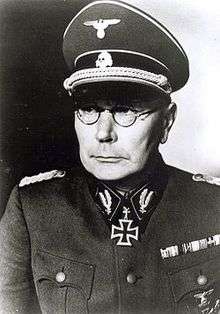Georg Keppler
Georg Keppler (7 May 1894 – 16 June 1966) was a high-ranking Waffen-SS commander during World War II. He commanded the SS Division Das Reich, SS Division Totenkopf, I SS Panzer Corps, III SS Panzer Corps and the XVIII SS Army Corps.
Georg Keppler | |
|---|---|
 | |
| Born | 7 May 1894 Mainz, German Empire |
| Died | 16 June 1966 (aged 72) Hamburg, West Germany |
| Allegiance | Nazi Germany |
| Years of service | 1913–1945 |
| Rank | SS-Obergruppenführer |
| Commands held | SS Division Das Reich, SS Division Totenkopf, I SS Panzer Corps, III SS Panzer Corps, XVIII SS Army Corps |
| Awards | Knight's Cross of the Iron Cross |
Career
Georg Keppler joined the army in 1913 and took part in World War I. Between 1920 and 1934, Keppler was a police officer commanding city and state police units. In 1935, he joined the paramilitary force of the Nazi Party, SS-Verfügungstruppe, leading a battalion size formation. In September 1939, his unit became a component of SS-Verfügungs Division. Keppler served as its regimental commander throughout the invasion of France, Balkans Campaign and in Operation Barbarossa. In August 1940, Keppler was awarded the Knight's Cross of the Iron Cross. On 15 July 1941, he took over for injured Theodor Eicke as a commander of the SS Division Totenkopf. He went on to command the SS Division Nord and the SS Division Das Reich.
From February 1943, Keppler held a number of administrative positions within the Waffen-SS. In August 1944, he was given a field assignment as commander of the I SS Panzer Corps, which he led until October 1944, during the later stages of the Battle of Normandy. He then returned to the Eastern Front, where he took over the III Panzer Corps. He remained with this unit until 2 April 1945 when he became the last commander of the XVIII SS Army Corps, surrendering the unit to the U.S. Army on 2 May 1945. After the war Keppler was interned; he was released in 1948. Keppler died in 1966.
Decorations
- Knight's Cross of the Iron Cross on 15 August 1940 as SS-Oberführer and commander of SS-Standarte "Der Führer".[1]
References
Citations
- Scherzer 2007, p. 437.
Bibliography
- Scherzer, Veit (2007). Die Ritterkreuzträger 1939–1945 Die Inhaber des Ritterkreuzes des Eisernen Kreuzes 1939 von Heer, Luftwaffe, Kriegsmarine, Waffen-SS, Volkssturm sowie mit Deutschland verbündeter Streitkräfte nach den Unterlagen des Bundesarchives [The Knight's Cross Bearers 1939–1945 The Holders of the Knight's Cross of the Iron Cross 1939 by Army, Air Force, Navy, Waffen-SS, Volkssturm and Allied Forces with Germany According to the Documents of the Federal Archives] (in German). Jena, Germany: Scherzers Militaer-Verlag. ISBN 978-3-938845-17-2.CS1 maint: ref=harv (link)
| Military offices | ||
|---|---|---|
| Preceded by SS-Obergruppenführer Matthias Kleinheisterkamp |
Commander of 3. SS-Panzer Division Totenkopf 15 July 1941 – 21 September 1941 |
Succeeded by SS-Obergruppenführer Theodor Eicke |
| Preceded by SS-Obergruppenführer Karl-Maria Demelhuber |
Commander of 6. SS-Gebirgs-Division Nord September 1941 – October 1941 |
Succeeded by SS-Obergruppenführer Karl-Maria Demelhuber |
| Preceded by SS-Obergruppenführer Matthias Kleinheisterkamp |
Commander of 2. SS-Division Das Reich 1 April 1942 – 10 October 1943 |
Succeeded by SS-Brigadeführer Herbert-Ernst Vahl |
| Preceded by SS-Brigadeführer Fritz Kraemer |
Commander of I. SS-Panzer Corps 16 August 1944 – 24 October 1944 |
Succeeded by SS-Obergruppenführer Hermann Priess |
| Preceded by SS-Obergruppenführer Felix Steiner |
Commander of III.(germanische) SS-Panzerkorps 30 October 1944 – 4 February 1945 |
Succeeded by SS-Obergruppenführer Matthias Kleinheisterkamp |
| Preceded by SS-Gruppenführer Heinz Reinfarth |
Commander of XVIII. SS-Armeekorps 4 February 1945 – 8 May 1945 |
Succeeded by dissolved on 8 May 1945 |